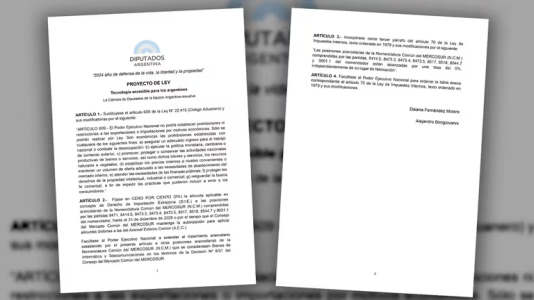All the Answers
Well-known member
Are tariffs on IT imports going down? The initiative already has a project in Congress and the Government is analyzing alternatives - Infobae

Source:
September 20, 2024
Two PRO deputies presented an initiative that seeks to reduce tariff barriers for computers and could also include cell phones. What the economic team is studying and the reaction of companies
By Natalia Donato

The bill introduced in the House of Representatives contemplates the reduction of tariffs for computers and cell phones
In line with the economic deregulation policies of Javier Milei 's government and with the measure applied by Mauricio Macri's government in 2017, a group of PRO deputies presented a bill that seeks to reduce the price of technological and computer goods in Argentina. The initiative aims to facilitate access to a greater variety of products such as computers, cell phones, and other electronic devices, by eliminating tariff barriers and promoting competition.
Meanwhile, the economic team is also considering some measures in this regard.
Specifically, the legislators' project proposes eliminating tariffs on computer and telecommunications equipment that enter or are exported to Mercosur. Deputies Diana Fernández Molero and Alejandro Bongiovani , promoters of the proposal, argue that the elimination of tariffs and other additional measures that make imports more expensive would allow prices for these products to fall. "It is necessary to encourage competition in the market and reduce taxes that end up affecting the consumer," said the legislators.
The Macri government had made progress with the removal of tariffs in 2017, but it was only for computers, notebooks and tablets. In those cases, those who imported these products paid 35% and then went on to pay 0%. They had also eliminated the 12% tariff for the import of components to manufacture computers. But in March of last year, after Samsung's willingness to return to manufacturing, via Mirgor, notebooks, the Alberto Fernández administration reintroduced the tariff and set it at 16 percent.

Following Milei's arrival in the Government, the sector remains on alert, as it is perfectly aware of the Executive's vision regarding imports, prices and competition.
Official sources confirmed to Infobae that the removal or reduction of tariffs on computers is being analyzed, but that the measure has a significant fiscal cost, so today would not be the time to move forward along that path. What they did rule out is the reduction of tariffs on cell phones, a sector that has a strong local production. 10 million devices are produced in Tierra del Fuego per year, according to data from the Association of Electronic Factories of Tierra del Fuego (Afarte).
The sector stressed that work will be done on the legislative front to learn more about the initiative and try to highlight the damage that the removal of tariffs would cause to the Tierra del Fuego industry. In fact, they say that when Macri moved forward with this approach, there was no impact on prices due to the decision itself. The prices of computers fell earlier because consumers, faced with the announcement of the tariff reduction, stopped their purchases.
Official sources confirmed to Infobae that the removal or reduction of tariffs on computers is being analyzed, but that the measure has a significant fiscal cost.
The business sector stated that “the tariff issue is always a measure that they fear, and even more so with the current government,” but at the same time stressed that “there are many factories in Argentina that produce cell phones, so reducing tariffs would have a direct impact on production and employment.” Regarding the reduction for computers, which is not only included in the bill but is also being evaluated by the Government, the impact would be less.
In addition to Samsung, which produces at the Mirgor plant in Garín, there are other companies that assemble notebooks in the country and that are members of the Argentine Chamber of Commercial Office Machines (Camoca). This is the case of Novatech, with its brand Nova; Pc Arts, with ASU, or Exo. But the structure they have today is much smaller than what they had years ago, so if this Congressional project or a measure from the Executive were to advance, they could easily dedicate themselves to importing without too much impact. The one with a more ambitious production process is Pixar, which sells locally and exports.
The entity's representative, Carlos Scimone , told this newspaper that yesterday the partners met to analyze the legislators' initiative and that some are in favor and others against; and it was decided to have meetings with the deputies to gain a deeper understanding of the project. "The general panorama is that there is no desire to invest, and these proposals that are appearing lower the level of interest to advance in production," said the director.
Project details
The proposal to reduce tariffs on imported products to zero includes a reduction in the internal tax rate, estimating a minimum decrease in tax revenue of 0.11% of GDP. According to the project, this would contribute to making technology cheaper in the country and encouraging domestic consumption, which today is partly carried out abroad and does not generate tax revenue for the Argentine State.The deputies argue that by reducing prices, a greater use of technology in the economy will be encouraged, which would increase productivity and, eventually, revenue from other taxes. They also consider that the reduction of smuggling of technological products, which has increased recently, would be another positive effect of the elimination of barriers to imports.
One of the most controversial aspects of the project is its impact on national production, especially on the industrial promotion regime of Tierra del Fuego, which grants tax benefits to technology companies established in that province. The elimination of tariffs, according to the deputies, could open the door to a comprehensive review of the regime, something that several business sectors see as an opportunity to modernize the incentive system and encourage greater openness in the market.

